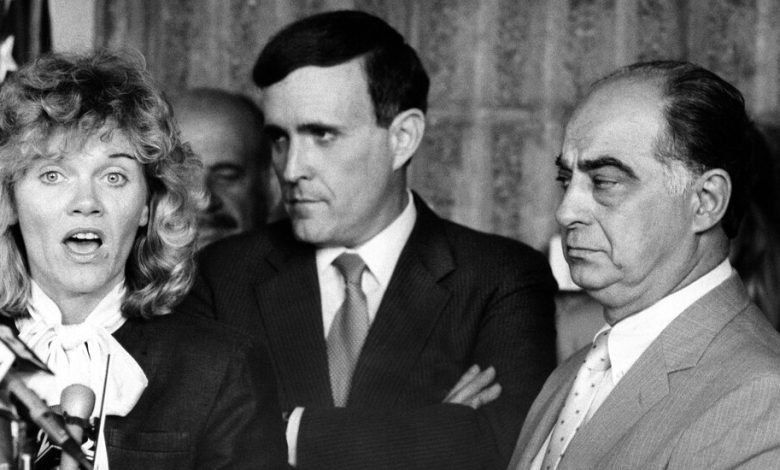Mary Shannon Little, Who Prosecuted Wedtech Scandal, Dies at 65

Mary Shannon Little, who investigated and prosecuted the Wedtech scandal that sent two Bronx congressmen and a borough president to prison on corruption charges and implicated U.S. Attorney General Edward Meese III, died on Nov. 23 at her home in Brooklyn. She was 65.
The cause was complications of breast cancer, which had been diagnosed three decades ago, her husband, Edward J.M. Little, said. As Mary Shannon, as she was known then, she had chosen Mr. Little to be her trial partner in the Wedtech case before marrying him.
In an email, Mr. Little called the Wedtech scandal “one of the largest public corruption cases ever brought” by federal prosecutors in Manhattan.
Wedtech had grown from a humble South Bronx machine shop in 1965 into a $100 million-a-year manufacturer of small engines, ordnance and other products for the armed forces, hailed as the epitome of a profitable minority-run military contractor. President Ronald Reagan had called one of its owners, who was of Hispanic heritage, “a hero for the ’80s.”
But in 1986, the business was imploding into bankruptcy after it was accused by federal prosecutors and the Bronx district attorney, Mario Merola, of having transformed itself into a criminal enterprise by paying bribes to win no-bid military contracts.
Federal prosecutors in Manhattan, led by Ms. Little’s boss, Rudolph W. Giuliani, charged the company with fraud for claiming that as a minority-owned business it had qualified for those contracts.
The Wedtech investigation triggered a broader scandal that brought down lobbyists as well as officials with the National Guard, the Navy and a labor union and led to the convictions of Representatives Mario Biaggi and Robert Garcia and the former Bronx borough president, Stanley Simon, all Democrats, on extortion and other racketeering charges.
“Mary Shannon inherited the case against Wedtech in April of 1986 when it consisted of vague suspicions lodged in the minds of two federal investigators,” James Traub wrote in “Too Good to Be True: The Outrageous Story of Wedtech” (1990).
“Over the course of a year of relentless investigation of her own,” he added, “she uncovered a vast fraud” and “then used what she had learned to reel in most of Wedtech’s principals as cooperating witnesses.”
In an email, Mr. Traub said: “At trial, she reduced Wedtech’s chief executive, John Mariotta, to helpless self-contradiction. By the end, almost all the bad actors had been brought to book. It was, first to last, a masterful performance.”
Mr. Garcia resigned from the House of Representatives in 1990, shortly after he and his wife, Jane Lee Garcia, were convicted in a federal trial of charges stemming from the Wedtech investigation. He spent three months in prison before an appeals court overturned the convictions that same year. When he was retried in 1991, he was found guilty of extorting a loan from a Wedtech officer, but in 1993 that conviction was voided, too.
In 1988, Mr. Biaggi was convicted of extorting stock worth $1.8 million to help Wedtech win contracts. He spent 26 months in prison. The other defendants were also convicted, largely on testimony by company officials cooperating with the prosecution. Mr. Simon spent more than two years in prison.
Mr. Meese was never convicted of wrongdoing, but he resigned in 1988 and declared that he had been exonerated after an independent counsel determined that “the available evidence is insufficient to support a conclusion” that the attorney general took bribes or illegal gratuities in the Wedtech scandal.
Marilyn W. Thompson, who wrote “Feeding the Beast: How Wedtech Became the Most Corrupt Little Company in America” (1990), said that during the trials Ms. Little had “brought moral force to her work, with laser focus, unerring judgment and an uncanny ability to connect the dots.”
Ms. Thompson, who is now senior editor of ProPublica, the nonprofit investigative journalism organization, said Ms. Little had been “a terrific legal mind who paved the way for other tough women prosecutors.”
Mary Theresa Shannon was born on March 26, 1957, in Las Vegas to John Shannon, a criminal investigator for the Internal Revenue Service, and Kathleen (Miller) Shannon, a registered nurse.
She graduated with a bachelor’s degree from the University of San Diego in 1978 and from New York University School of Law in 1982. She worked for the Legal Aid Society of New York and beginning in 1985 served as an assistant U.S. attorney under Mr. Giuliani between stints working for the law firm of Robert Kasanof, the Legal Aid Society’s former director.
In 1990, Ms. Little became a managing director of Kroll Associates, the corporate investigative company, and in 1997 went on to work for other risk management and consulting firms. Among her responsibilities were overseeing claims related to the Deepwater Horizon oil rig explosion that killed 11 rig workers and spewed millions of barrels of oil into the Gulf of Mexico in 2010; monitoring the internal review of a Swiss bank in Zurich; and vetting potential running mates and cabinet members for Democratic presidential nominees.
In addition to her husband, whom she married in 1989, she is survived by two daughters, Bridget Little Hammond and Genevieve Little; a brother, Dr. Francis Shannon; a sister, Maurine Shannon; and a grandson.
